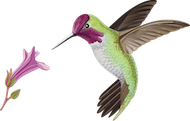The Motus Wildlife Tracking System (hereafter Motus: Latin for movement or motion) is an international collaborative research network that uses cooperative automated radio telemetry to track small flying organisms (birds, bats, and insects). When compared to other technologies, automated radio telemetry currently allows researchers to track some of the smallest animals possible, with high temporal and geographic precision, over great distances. The system enables a community of researchers, educators, organizations, and citizens to undertake impactful, cost-effective, research and education on the ecology and conservation of migratory animals.
Motus collaborators (a community of researchers, non-government and government organizations, and individuals) deploy small radio transmitters affixed to animals that are tracked by Motus stations placed at strategic locations throughout the hemisphere. Depending on the configuration of a station, they can monitor tags continuously, or as they occupy space monitored by stations across the landscape up to 20km away.
The Gottlieb Native Garden's unit is intended to cover a slice of the Pacific Flyway that intersects Los Angeles County.



